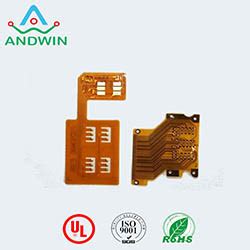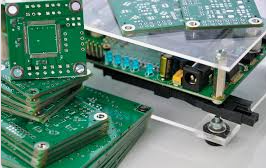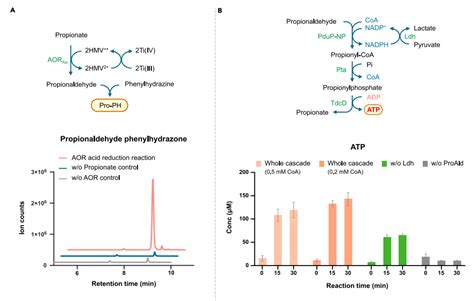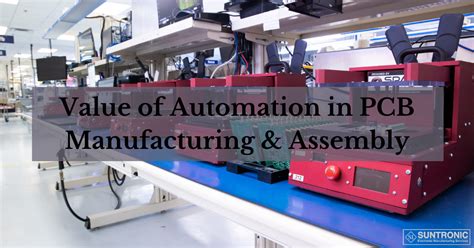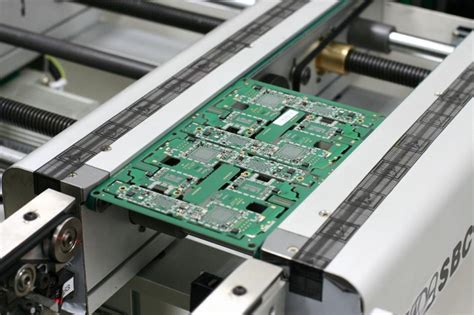Top Circuit Card Assembly Manufacturers Shaping the Future
Key Takeaways
As the circuit card assembly (CCA) sector evolves, it is becoming increasingly clear that the success of this industry will primarily depend on the innovations brought forward by leading manufacturers in pcb assembly. These companies are not only improving efficiency and precision in pcba processes but also enhancing overall product quality. By leveraging advanced technologies like automation and artificial intelligence, manufacturers can streamline their operations, thereby reducing costs and production cycles. Moreover, a strong emphasis on sustainable practices is evident among top players in the market who are integrating eco-friendly methods within their manufacturing processes. This shift not only addresses environmental concerns but also acts as a competitive advantage in an ever-demanding market landscape. By staying attuned to future trends and consumer needs, these manufacturers are positioning themselves to significantly impact the direction of the circuit card assembly industry. Ultimately, understanding the dynamics of leading circuit card assembly manufacturers will provide key insights into the future potential and resilience of this essential technological field.
Introduction to Circuit Card Assembly
Circuit card assembly (CCA), also known as pcb assembly or pcba, plays a pivotal role in the electronics manufacturing industry. This process involves the intricate procedure of assembling electronic components onto a printed circuit board (PCB), which serves as the backbone for numerous electronic devices. The growing demand for sophisticated electronics has, in turn, escalated the importance of quality and innovation in circuit card assembly operations. As a result, manufacturers are now focusing on advanced technologies and sustainable practices to remain competitive and meet customer expectations.
Distinct from traditional manufacturing methods, modern pcba techniques incorporate automated systems and precision tooling. This shift not only enhances efficiency but also significantly reduces errors during assembly. Leading manufacturers are investing in state-of-the-art equipment such as laser soldering systems and automated optical inspection machines to ensure each assembly meets high-quality standards.
“Innovation in pcb assembly is not just about maintaining quality; it’s about revolutionizing how we approach electronics manufacturing.”
Furthermore, sustainability has emerged as a critical consideration for these manufacturers. They are adopting eco-friendly materials and methods that reduce waste while ensuring that their practices comply with both local and international regulations. This commitment to sustainable development not only benefits the environment but also appeals to consumers who prioritize ethical production.
Given the rapid advancements within this field, staying informed about the latest technologies and trends is essential for both industry professionals and consumers alike. As market leaders continue to shape the future of circuit card assembly, their efforts will undoubtedly influence how electronics are manufactured for years to come.
| Key Benefits of Quality PCB Assembly |
|---|
| Enhanced Reliability |
| Reduced Production Costs |
| Increased Market Competitiveness |
| Sustainable Practices |
As companies strive to meet the increasing expectations for quality and sustainability, they continue to push the boundaries of what is possible within circuit card assembly, ensuring that the future of electronics remains bright and innovative.
Importance of Quality in Circuit Card Assembly
In the rapidly evolving field of pcb assembly, the significance of quality cannot be overstated. The quality of a pcba directly impacts the performance, reliability, and longevity of electronic devices. As consumers demand higher standards in technology, manufacturers are compelled to prioritize rigorous quality control processes throughout the assembly line. This includes implementing advanced testing methods that ensure each component is functioning optimally and is capable of enduring various conditions. Moreover, focusing on quality helps in minimizing faults and defects, which can lead to significant cost savings by reducing waste and enhancing customer satisfaction. Manufacturers who emphasize quality often utilize the latest technologies in their operations, integrating automation and precision engineering to achieve greater accuracy and efficiency. Ultimately, a commitment to quality not only fortifies a company’s reputation but also contributes to the advancement of the entire circuit card assembly industry, setting benchmarks that encourage innovation and sustainable practices.

Innovative Technologies in Circuit Card Assembly
Innovative technologies play a crucial role in transforming circuit card assembly processes, enhancing efficiency, quality, and adaptability. One of the foremost advancements in this sector is the integration of robotics and automation, which streamline workflows and reduce human error. PCB assembly techniques have evolved, employing surface mount technology (SMT) that allows for the placement of components directly onto the surface of PCBA boards, maximizing space and improving performance. Furthermore, advancements in 3D printing are revolutionizing prototyping and production, enabling manufacturers to create complex designs that were previously unattainable through traditional methods.
Additionally, circuit card assembly manufacturers are increasingly adopting smart manufacturing practices through the implementation of IoT devices. These technologies enable real-time monitoring of production processes, providing insights into efficiency metrics and quality control measures. The utilization of advanced software for simulation and testing also enhances reliability before products hit the market. This commitment to innovation positions leading companies to better meet evolving consumer demands while maintaining rigorous standards for durability and functionality.
As sustainability becomes paramount in today’s manufacturing landscape, many firms are exploring green technologies within their PCBA processes. Using eco-friendly materials and reducing waste are paramount objectives that align with global goals for environmental responsibility. Ultimately, these innovative technologies forge a path toward an advanced future for circuit card assembly, empowering manufacturers to rise to the challenge while reshaping industry standards.
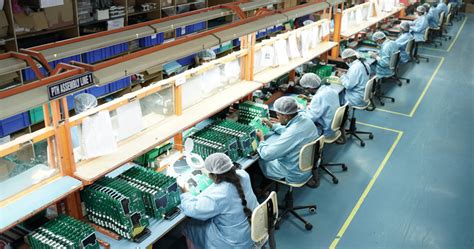
Leading Manufacturers in the Circuit Card Assembly Industry
The circuit card assembly (CCA) industry is marked by a diverse range of pcb assembly manufacturers that are leading the way in innovation and quality. Prominent companies in this sector not only focus on delivering top-notch pcba solutions but also strive to integrate advanced technologies into their production processes. These manufacturers utilize cutting-edge automation, high-precision machinery, and sophisticated quality control systems to enhance the reliability and efficiency of their assemblies. A noteworthy trend among these leading manufacturers is the emphasis on sustainable practices, which includes reducing waste and optimizing materials usage throughout the supply chain. As these manufacturers continue to invest in research and development, they propel the industry forward by adopting eco-friendly methodologies while maintaining exceptional product standards. This focus not only boosts their competitive edge but also meets the growing demand for sustainability in today’s marketplace, making them pivotal players in shaping the future of circuit card assembly.
Sustainable Practices Among Top Manufacturers
In recent years, sustainable practices have emerged as a focal point for leading circuit card assembly (CCA) manufacturers. As the demand for high-quality PCB assembly continues to rise, top manufacturers are recognizing the necessity of integrating environmentally conscious strategies into their production processes. From minimizing waste during the PCBA fabrication to utilizing eco-friendly materials, these companies are redefining industry standards. For instance, many manufacturers are investing in advanced recycling technologies that enable the recovery of precious metals and components from outdated assemblies. By implementing energy-efficient practices and reducing carbon emissions, these innovative firms not only contribute to sustainability but also enhance their operational efficiency. Moreover, certifications such as ISO 14001 have become commonplace among respected circuit card assembly providers, showcasing their commitment to environmental management. As the industry evolves, it is clear that a focus on sustainable practices will be instrumental in shaping a resilient future for PCB assembly, ensuring that manufacturers play a pivotal role in fostering both economic and ecological advancements.

Future Trends in Circuit Card Assembly
As the circuit card assembly (CCA) landscape continues to evolve, several key trends are emerging that are poised to influence the industry significantly. One of the most notable trends is the increasing demand for miniaturization and the need for high-density interconnect (HDI) solutions in pcb assembly. Manufacturers are innovating to accommodate smaller devices while maintaining functionality, pushing the boundaries of pcba technology. Additionally, automation is becoming a cornerstone of efficient processes, with robotic systems and AI-driven tools enhancing precision and reducing production time. The integration of Industry 4.0 practices is also fostering smarter factories where connectivity and data analytics improve quality control and operational efficiency in circuit card assembly processes. Sustainability is another critical focus; top manufacturers are adopting eco-friendly materials and energy-efficient practices to reduce their environmental footprint, ensuring that they meet both consumer demand for sustainable products and regulatory requirements. Furthermore, advancements in 5G technology are pushing manufacturers to adapt their pcb assembly techniques to support higher frequency applications, thereby setting a new standard for performance in the industry. As these trends unfold, they underscore the critical role that leading manufacturers play in shaping a resilient and innovative future for pcba, ultimately paving the way for new applications across various sectors including automotive, healthcare, and telecommunications.
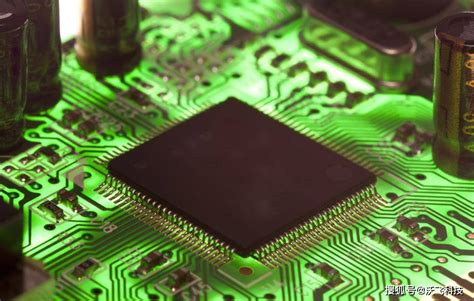
Case Studies of Successful Circuit Card Assembly Companies
In the dynamic landscape of pcb assembly, several companies have emerged as leaders, demonstrating excellence in pcba practices and significantly impacting the industry. For instance, one noteworthy case is that of a manufacturer that prioritized advanced automation technologies in their assembly lines. This investment not only enhanced their production efficiency but also reduced error rates significantly, proving that adherence to quality is paramount in circuit card assembly. Another example involves a company that integrated environmentally sustainable practices into their operations, successfully minimizing waste while maintaining high standards of product quality. By employing cutting-edge materials and processes, they set a new benchmark for sustainability in the industry. Additionally, several firms are utilizing innovative design software that optimizes circuit layout and component placement, further contributing to the overall improvement in performance and reliability of pcb assemblies. These case studies illustrate how leading manufacturers are not only rising to meet current demands but are also paving the way for future advancements in pcba, underscoring the significance of continuous innovation and commitment to quality within this vital sector.
Conclusion: The Impact of Manufacturers on the Industry’s Future
As the pcb assembly landscape continues to evolve, the influence of leading pcba manufacturers becomes increasingly significant. These companies are not only advancing technology but also setting new benchmarks for quality and sustainability in the industry. Their commitment to innovative solutions has led to enhanced production processes, resulting in more reliable and efficient circuit card assemblies. The use of cutting-edge technologies—such as automation, robotics, and artificial intelligence—has streamlined operations and reduced production times. Furthermore, many manufacturers are prioritizing environmentally friendly practices, integrating sustainable materials and waste reduction strategies into their workflows. Such initiatives not only appeal to a growing consumer base that values transparency and responsibility but also position these manufacturers as industry leaders. By continuously adopting advanced methods and adhering to high-quality standards, these companies are shaping a resilient future for pcb assembly, ultimately influencing market trends and consumer preferences across the globe. As we look ahead, it is clear that their actions will play a pivotal role in defining the next era of innovation in circuit card assembly.
Conclusion: The Impact of Manufacturers on the Industry’s Future
The landscape of pcb assembly is undergoing a significant transformation, largely driven by the innovative practices of leading manufacturers. These circuit card assembly manufacturers are not only focusing on the production of high-quality pcba, but they are also investing heavily in advanced technologies that enhance efficiency and reliability. By prioritizing sustainable practices, these companies are contributing to environmental conservation while meeting the ever-growing demand for electronic devices. The interplay between traditional manufacturing processes and modern innovations is creating a more robust supply chain, allowing for quicker turnarounds and reduced costs. As customers increasingly seek customized solutions, manufacturers are leveraging agile methodologies, pushing the boundaries of what is possible in circuit card assembly. This proactive approach not only ensures that they remain competitive but also sets a new standard in quality and technological advancement for the industry. In recognizing their pivotal role, it becomes clear that these manufacturers will continue to shape the future of pcb assembly, ultimately determining the trajectory of advancements within electronic manufacturing as a whole.
FAQs
What is circuit card assembly?
Circuit card assembly, often referred to as pcb assembly, is the process of connecting electronic components to a printed circuit board (PCB) to create functioning electronic devices. This involves several steps, including soldering and testing.
Why is quality essential in pcb assembly?
Quality in pcba is critical because it ensures the reliability and performance of the final product. High-quality assemblies minimize the risk of failure, which can lead to costly recalls or repairs.
What technologies are shaping the future of circuit card assembly?
Innovative technologies such as automation, artificial intelligence, and advanced manufacturing techniques are transforming circuit card assembly. These advancements improve efficiency, precision, and quality in pcb assembly processes.
Who are the leading manufacturers in the circuit card assembly industry?
Leading manufacturers include companies known for their commitment to quality and innovation. They invest in state-of-the-art equipment and sustainable practices to enhance their production capabilities.
How do manufacturers implement sustainable practices in circuit card assembly?
Many top manufacturers focus on reducing waste, optimizing energy consumption, and using environmentally friendly materials in their pcba practices. These sustainable approaches benefit both the environment and their bottom line.

